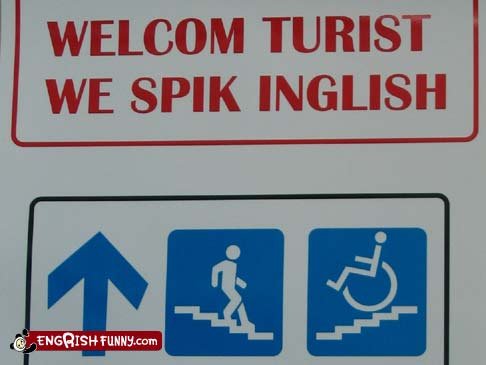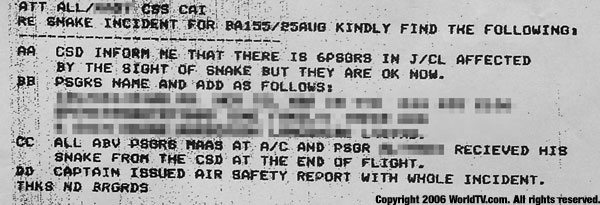Where is the English language rule book ? Although some like Erica Blexley note value in teaching university entrants grammar, I find working with global citizens encourages a pragmatic view that what is important is effective communication, rather than zealous adherence to a poorly defined, conservative and socially divisive code. You feel me ? Ben Ambridge seems to.
I was taught not to space before a question mark, although Bill Gates keeps telling me this is just plain wrong with a line of red dots. I think words like internet should only have capitals when commencing a new sentence. I care little that practice is a noun and practise the verb form, when they work just fine inter-changeably. The passive UK writing style our students are encouraged to adopt is not much liked by west coast word-processing coders. Apostrophes, except the one in my last name, are best avoided, they just slow your typing down.
'Engrish' powers international trade
The good news is that language accuracy seems to matter less these days, particularly if you operate as a global citizen and immerse yourself in a social media world, beyond the Word spell checker, that tolerates volume for quality and plays rather fast-and-loose with that elusive rule book. Stewart Riddle notes the growing power of English for international trade, with its precarious multi-local variants and that four-out-of-five English interactions are taking place between non-natives. It is also a world, thanks to Web 2.0 and mobile devices, where the spoken word and powerful infographics are becoming increasingly prevalent.
Inspite of influential texts from the likes of Lynne Truss, self proclaimed spelling bee, and the historic efforts of new world radicals behind the Carnegie funded 1906 simplified spelling board reform, supported by one Theodore Roosevelt, that brought some more logic to the western Atlantic language. By dropping redundant vowels (e.g. behavior/behaviour) and improving letter orders (e.g. centre/center) the command to "write or speak in English" is not as clear cut as it might first sound. Which English do you mean exactly ?
Thanks to Hollywood's cultural prowess I understand 'morican and television soap Neighbours tuned my ear to Australian-English. However, I was surprised to hear an international student say that they found non-natives easier to understand speaking English. I guess there is logic of mutual appreciation of the communication challenge, fewer colloquialisms and perhaps slower, clearer delivery. Brits often clip important vowel sounds that even Americans find challenging. I love the literally infused Indian-English that retains the Shakespearian evoking thrice and the anticipatory pre-pone that complements the over used post-pone term. Should the international standard rather be dubbed English linguas francas ? Ironic note: what is the English for lingua franca ?
"Proper English" - what is that ?
Thanks to Hollywood's cultural prowess I understand 'morican and television soap Neighbours tuned my ear to Australian-English. However, I was surprised to hear an international student say that they found non-natives easier to understand speaking English. I guess there is logic of mutual appreciation of the communication challenge, fewer colloquialisms and perhaps slower, clearer delivery. Brits often clip important vowel sounds that even Americans find challenging. I love the literally infused Indian-English that retains the Shakespearian evoking thrice and the anticipatory pre-pone that complements the over used post-pone term. Should the international standard rather be dubbed English linguas francas ? Ironic note: what is the English for lingua franca ?
Campaign to re-introduce 'thrice' begins... hashtag THRICE ?
Being told recently in an academic journal submission rejection that 'p.a.' is an abbreviation for per annum that the average person would not be expected to understand was amusing. Really ? My usual refrain when I smell inappropriate moral conservatism is to make up Bardian sounding quips like "Ye thou thinkest wyth stynking pot uponeth thy headde." Yay. Although Ye (olde shoppe) I think meant 'the' and only latterly have I appreciated the nuanced class struggle interplay between usages of thee and thou, formal and familiar terms for you in old English. The idea being to emphasise the ever moving nature of language, its role to enable effective communication (across time and space) and not to discriminate between those with and without an expensive native English education.
Text speak is dead ?
As a young graduate trainee in the airline industry I was introduced to TELEX speak and TLAs, practical shortenings, I was told that saved money on one of the pre-internet global comms networks that charged per character. We used two and three letter codes (Three Letter Anachronisms) and abbreviations that meant "txt spk" when it arrived, was already second nature. During our training we were challenged to make words up from airport city pairings, like MANDUB and PERLAS (Manchester-Dublin and Perth-Las Vegas). I enjoyed the mirth generated when one of my successful business cases justified flying into FUK (long oooooh vowel, please) code for Fukuoka, Japan and heading on holiday to the Thai beach resort of Phuket (HKT). Colleagues would have secret conversations using pseudo flight bookings PNRs, (Passenger Name Records) that has echoes of tor, the dark net, that is popular amongst the paranoid and criminal keen to avoid Big Brother oversight. TELEX speak was always in uppercase capital letters, not unlike the lowercase only internet, which also does not recognise the special characters that makes spelling my last name difficult. If only Sir Tim had been called O'Berners-Lee ?
It is on the telex machines that I picked up, and continue to use, terms like KK (confirm), NN (need), the message sign off BRGDS (best regards), affectionately informal TTFN (ta-ta for now) and PAX, the Romanesque curtailment of passenger. Ave Caesar ! You will now be able to understand this code string, NN 4PAX 01APRLONLOS, as a request for four seats on 1st April on the flight from London to Lagos. Simples.
Email killed facsimiles and my beloved TELEX of course, as smart phones and social media now prevail over email, which remains only popular with the older generations. Rather counter intuitively Nenagh Kemp's (University of Tasmania) research on exposure to texting, found it was a signal of better literacy skills. LOL. Of course, I read LOL as the inappropriately affectionate Lots-Of-Love, not its current meaning Laugh-Out-Loud. IMHO according to my new BFF Josh, Txt spk is ded2. Predictive text seems to be evolving our language again, gone are traditional spelling mistakes, replaced by sound-the-same homophones and random error words thanks to the poke yoke data input accuracy afforded by tech that does not hold efficient textisms in its default US infused library.
But even this may not last for long, as dictation, voice interaction services like Siri and Cortana, video conferencing and the stark growth in image and video based information sharing take centre stage. Check out the image and video rich bbc.co.uk and theindependent.co.uk and ask the question: Are traditionally text reliant academics like myself looking at the post meteor fall out dust, like the dinosaurs did back in the day ?
How long will it be before a tech start up, perhaps dubbed Turnitaround, offers this new, robotic revenue stream service ? "HAL, write my 2,000 word marketing plan for Justin O'Brien using Azerbaijani inflected English, 75% please."



